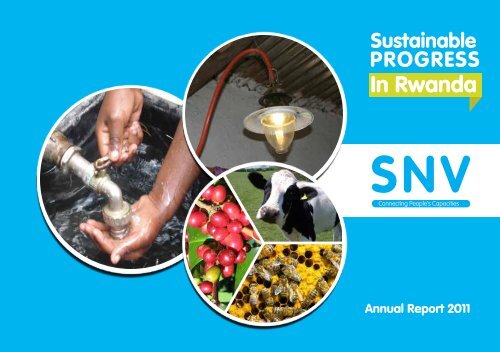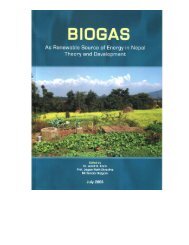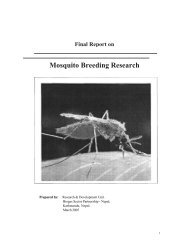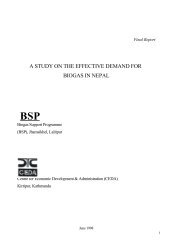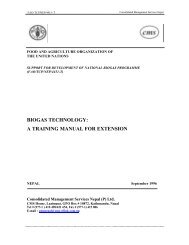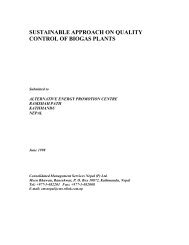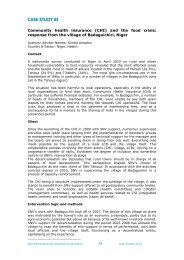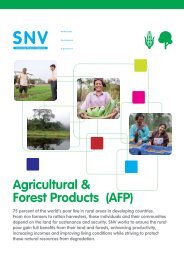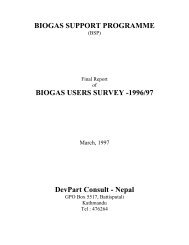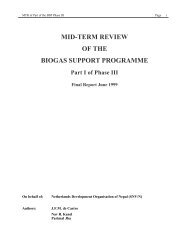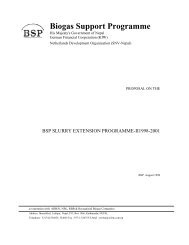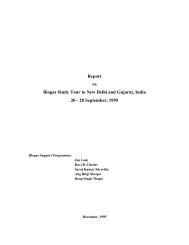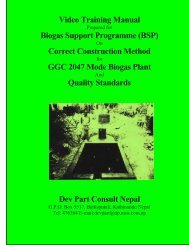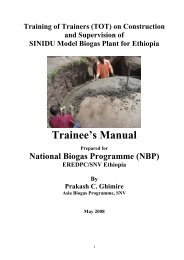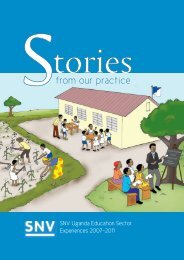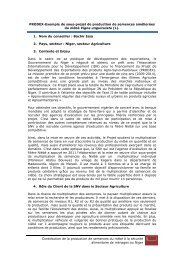download (pdf, 3MB) - SNV
download (pdf, 3MB) - SNV
download (pdf, 3MB) - SNV
You also want an ePaper? Increase the reach of your titles
YUMPU automatically turns print PDFs into web optimized ePapers that Google loves.
Sustainable<br />
PROGRESS<br />
In Rwanda<br />
Connecting People’s Capacities<br />
Annual Report 2011
2<br />
<strong>SNV</strong> is dedicated to a society where all people enjoy the<br />
freedom to pursue their own sustainable development.<br />
Our advisors contribute to this by strengthening the capacity of<br />
local organisations
<strong>SNV</strong> Rwanda 2011<br />
3<br />
Snapshot 2011<br />
3 Sectors :<br />
- Agriculture<br />
- WASH<br />
- Renewable Energy<br />
Client organizations: 82<br />
Assignments: 91<br />
Implementing partners: 28<br />
Staff: 14 advisors and 9<br />
support staff<br />
Budget: EUR 2,091,065<br />
About <strong>SNV</strong>, Netherlands Development Organization<br />
Created in the Netherlands in 1965,<br />
today <strong>SNV</strong> works in 36 countries<br />
across Africa, Asia, Latin America<br />
and the Balkans. <strong>SNV</strong> believes that inclusive<br />
growth and development is essential<br />
for enduring success — that is, sustained<br />
poverty reduction requires poor men and<br />
women to both contribute to and<br />
benefit from growth while having<br />
access to quality basic services.<br />
<strong>SNV</strong> works together with local<br />
partners to provide tech-<br />
.<br />
nical expertise in agriculture;<br />
renewable energy; and water,<br />
sanitation and hygiene; thereby<br />
contributing to find local solutions<br />
to global challenges and sowing the<br />
seeds of lasting change.<br />
Good governance principles like accountability,<br />
transparency and participation<br />
are at the heart of our work and we<br />
believe that sustainable development is<br />
based on gender equity and the inclusion<br />
of poor and marginalized people.<br />
<strong>SNV</strong> Rwanda was established in 1980 and<br />
currently employs 23 advisory and administrative<br />
staff. We are committed to supporting<br />
the Government and the people of<br />
Rwanda to reach their development<br />
goals.<br />
We build capacities<br />
of local organizations<br />
for lasting improvement<br />
in the livelihoods of the<br />
Rwandan people<br />
Our work focuses on the<br />
following sectors:<br />
• Water, sanitation<br />
and hygiene<br />
• Renewable energy<br />
(biogas production and improved<br />
cook stoves).<br />
• Agriculture (coffee, honey and dairy<br />
sub-sectors).
4<br />
Message from the Country Director<br />
It gives me great pleasure to present to<br />
you <strong>SNV</strong> Rwanda’s Annual Report 2011.<br />
2011 marked <strong>SNV</strong>’s 30th year of operation<br />
in Rwanda. We celebrated the occasion<br />
with our many partners and clients and<br />
took time to reflect on the impact of our<br />
programmes over the last three decades.<br />
Recognition of our achievements<br />
and appreciative comments from all<br />
in attendance, particularly from the<br />
Dutch ambassador and the Permanent<br />
Secretary of MINALOC, were warmly<br />
received and are encouraging as we<br />
undergo some strategic and internal<br />
changes and prepare for 2012.<br />
One such change was the <strong>SNV</strong> corporate<br />
decision to focus our interventions<br />
on three sectors, namely agriculture;<br />
renewable energy; and water, sanitation,<br />
and hygiene.<br />
<strong>SNV</strong> Rwanda successfully completed<br />
its withdrawal from the education and<br />
tourism sectors, as planned. Partners<br />
and clients were informed in advance of<br />
our decision to discontinue interventions,<br />
outstanding commitments were<br />
concluded, coordination of the Rwanda<br />
Education NGO Platform was handed over,<br />
and a capitalisation document detailing<br />
<strong>SNV</strong>’s experiences in the tourism sector<br />
was widely distributed and well-received.<br />
Another change has been in our<br />
management. After five years as <strong>SNV</strong><br />
Rwanda Country Director, Jean de Matha<br />
Ouedraogo left in October 2011 to take up<br />
his new position as Country Director of<br />
<strong>SNV</strong> Zambia. <strong>SNV</strong> Rwanda accomplished<br />
a great deal under Jean de Matha’s<br />
leadership and we wish him continued<br />
success in Zambia. A new director will be<br />
appointed in the first half of 2012.<br />
In 2011, we continued to support the coffee<br />
and beekeeping sectors, while engaging<br />
for the first time in the dairy sector.<br />
In WASH, we expanded our geographic<br />
focus to four districts in the north, and<br />
in renewable energy, we continued to<br />
support the National Domestic Biogas<br />
Programme. Building on the achievements<br />
of previous years, all sectors realised<br />
good results and deepened partnerships<br />
with international and local organisations.
<strong>SNV</strong> Rwanda 2011<br />
5<br />
Message from the Country Director cont’d<br />
In collaboration with the Embassy of the<br />
Kingdom of the Netherlands, our work<br />
on domestic accountability continued<br />
through the Joint Action<br />
Development Forum project.<br />
Our localisation strategy<br />
continued to be<br />
implemented successfully.<br />
The number of local<br />
capacity builders engaged<br />
and supported increased,<br />
and a high level of quality<br />
service delivery was maintained.<br />
As we look ahead to 2012, we will continue<br />
our on-going interventions in the agriculture,<br />
renewable energy and WASH sectors, as<br />
well as in JADF, while firmly engaging in the<br />
improved cook stoves sector. While we will<br />
continue to provide advisory services and<br />
knowledge development and brokering in<br />
We are looking forward to<br />
up scale efforts in WASH,<br />
Biogas and Agriculture<br />
through our partnership with<br />
the Government and other<br />
development organizations<br />
all sectors, we will give particular attention to<br />
business development services in both the<br />
agriculture and renewable energy sectors.<br />
We also look forward to<br />
up scaling our efforts in<br />
WASH through a renew<br />
partnership with EWSA<br />
and UNICEF.<br />
In all sectors, we<br />
will continue to bring<br />
partners together to<br />
collaborate in order to<br />
enhance economies of scale<br />
and up scale efforts. To support this,<br />
we will further expand our localisation<br />
programme.<br />
Erik van Waveren<br />
Acting Country Director<br />
<strong>SNV</strong> Rwanda
6<br />
Rwanda<br />
In 2011, Rwanda’s GDP grew by an<br />
impressive 8%, while inflation stayed<br />
below double digits. Growth was largely<br />
driven by the service and agricultural<br />
sectors, which contributed 43% and 42%<br />
of GDP, respectively. The industrial sector<br />
also showed robust growth (particularly<br />
mining), contributing 14% of GDP.<br />
The government continues its efforts to<br />
diversify and transform the economy into<br />
a knowledge-based one focused on high<br />
value transformation and services, jobs<br />
and incomes. Rwanda also promotes<br />
productive sectors like agriculture,<br />
mining, and tourism, to further reduce<br />
donor dependency and improve its trade<br />
balance.<br />
The Government is continuously improving<br />
Rwanda’s infrastructure.
<strong>SNV</strong> Rwanda 2011<br />
7<br />
Despite the progress made to date, an<br />
estimated 56% of Rwandans still live<br />
below the poverty line. The economy<br />
is very dependent on subsistence<br />
agriculture, which contributes about<br />
34% of GDP, 80% of employment and<br />
50% of exports. Some segments of the<br />
rural poor still experience water and<br />
food uncertainty, with food insecurity<br />
affecting 21% of Rwandans.<br />
Rwanda has a high population density<br />
(384 inhabitants/km2) and a low<br />
urbanisation rate. Measures have been<br />
put in place to stimulate agricultural<br />
intensification and to address<br />
environmental challenges related to the<br />
high pressure on resources such as land<br />
and water. High levels of investment<br />
are still required in order to achieve the<br />
agricultural transformation.<br />
Key labour market skills are also<br />
lacking—almost 75% of Rwanda’s labour<br />
force is unskilled, and less than 10% of its<br />
working population is educated beyond<br />
primary level.<br />
Expensive energy<br />
and high transport<br />
costs, relative to<br />
its neighbours,<br />
raise the<br />
costs of doing<br />
business in<br />
Rwanda.<br />
Despite<br />
t h i s ,<br />
Rwanda<br />
continues to climb up the ‘doing<br />
business’ list and is now ranked 50 (was<br />
58 in 2010).<br />
The country scores particularly high<br />
with respect to starting a business,<br />
fiscal procedures, property registration,<br />
access to credit, and<br />
international commerce.<br />
The third phase of<br />
the decentralisation<br />
process is<br />
underway,<br />
and seeks to<br />
strengthen district<br />
level service<br />
delivery and<br />
local economic<br />
development. Local actors<br />
are encouraged to participate actively<br />
in identifying and removing barriers to<br />
development.
8<br />
2011 Highlights<br />
In agriculture:<br />
• 69,000 <strong>SNV</strong> supported coffee<br />
farmers increased their incomes<br />
from an average of USD 150 to<br />
USD 201.<br />
• Eight <strong>SNV</strong> supported coffee<br />
cooperatives won the 2011 Rwanda<br />
Cup of Excellence.<br />
• Production of fully washed coffee by<br />
<strong>SNV</strong> supported cooperatives increased<br />
by 40% between 2010 and 2011.<br />
• <strong>SNV</strong> services reached 2,618<br />
beekeepers.<br />
• Production of bee products (honey,<br />
wax) increased from 25 to 47 kg per<br />
household.<br />
• Incomes from bee products increased<br />
from USD 84 to USD 120 per household.<br />
In renewable energy:<br />
• 785 biogas digesters were built and<br />
benefitted 3,330 people.<br />
• A cheaper biodigester model was<br />
developed and made available on the<br />
market.<br />
In WASH:<br />
• <strong>SNV</strong> contributed to new access to<br />
clean water for an estimated 105,000<br />
people.<br />
• <strong>SNV</strong> contributed to improved sanitation<br />
for 223,000 people.<br />
• Local water sanitation and hygiene<br />
organisations in the districts of Rubavu,<br />
Nyabihu, Musanze and Burera were<br />
sensitised and trained on hygiene,<br />
cost of water, and public private<br />
partnerships.<br />
• <strong>SNV</strong> successfully supported the<br />
AfricaSan conference.<br />
In Joint Action Development Forum<br />
(JADF):<br />
• A training programme for improved<br />
JADF facilitation and effectiveness was<br />
rolled-out country-wide and 15 districts<br />
received tailor made JADF coaching.<br />
• JADF became a central mechanism<br />
for implementing national plans.<br />
Moreover:<br />
• <strong>SNV</strong> withdrew smoothly from the<br />
education and tourism sectors.<br />
• <strong>SNV</strong> produced and disseminated an<br />
ebook on <strong>SNV</strong>’s tourism experiences.<br />
• 683 people were trained in specific<br />
vocational skills.<br />
• 2,636 people were sensitised on child<br />
labour laws and policies and the<br />
impact on children’s education.
<strong>SNV</strong> Rwanda 2011<br />
9<br />
Agriculture<br />
JADF<br />
WASH<br />
Biogas
10<br />
Our Approach<br />
<strong>SNV</strong> Rwanda seeks to empower<br />
local communities, businesses, and<br />
organisations to break the cycle<br />
of poverty and guide their own<br />
development by helping them to obtain<br />
the tools, knowledge, and connections<br />
they need to increase their incomes and<br />
gain access to basic services.<br />
We build this capacity by offering<br />
advisory services that focus on creating<br />
effective solutions with local impact.<br />
The knowledge that we generate from<br />
our advisory work is shared with other<br />
local organisations and capacity builders<br />
through knowledge networking, with the<br />
goal of expanding access to, application<br />
and regeneration of knowledge.<br />
Lastly, evidence-based advocacy work<br />
allows us to influence institutional<br />
structures, policies, and practices in<br />
ways that have been proven to benefit<br />
the poor.<br />
Value chain development<br />
<strong>SNV</strong> uses a value chain approach to propoor<br />
development. A value chain is the<br />
system of people, organisations, and<br />
activities needed to create, process and<br />
deliver a product or service from supplier<br />
to customer. We use the value chain<br />
approach to effect change throughout<br />
the whole system, thereby maximising<br />
the possibilities for economic, social and<br />
environmental sustainability.<br />
<strong>SNV</strong> facilitates value chain development by<br />
building technical, managerial, networking<br />
and governance capacities, thereby<br />
developing profitable and sustainable<br />
practices in the value chain, resulting in<br />
increased incomes and employment for<br />
the poor, especially women.<br />
Localisation<br />
The aim of our localisation strategy<br />
is to equip Rwandan institutions and<br />
individuals with the ability to provide high<br />
quality capacity development services
<strong>SNV</strong> Rwanda 2011<br />
11<br />
aimed at poverty reduction and promoting<br />
good governance.<br />
Local capacity builders (LCBs) are in-country<br />
agents that play a major role in building the<br />
capacity of our clients. Like <strong>SNV</strong> itself, LCBs<br />
provide a range of advisory, knowledge<br />
brokering, and advocacy services. In turn,<br />
<strong>SNV</strong> strengthens LCBs internal capacity<br />
through on the job coaching, special courses<br />
and training, and sharing information.<br />
To complement our localisation activities,<br />
<strong>SNV</strong>, at the request of Rwanda’s Ministry<br />
of Trade and Industry, is developing a<br />
proposal for a Business Development<br />
Services Facility (BDSF) — a demandled<br />
and market-based mechanism<br />
to connect small and medium<br />
enterprises (SMEs) and other productive<br />
organisations to local service providers.<br />
The Facility would also support SMEs by<br />
co-funding the business and professional<br />
services that they need. The BDSF initiative<br />
would be linked to Rwanda’s broader<br />
Micro Small and Medium Enterprise<br />
(MSME) development project.<br />
Multi actor processes<br />
<strong>SNV</strong> reinforces and coaches multi<br />
stakeholder processes in order to connect<br />
and link different actors for constructive<br />
cooperation, improved accountability<br />
and feedback, access to information and<br />
participation.<br />
The JADF is an example of an<br />
Multi Stakeholder Platform<br />
supported by <strong>SNV</strong>. It is a<br />
space for consultation<br />
and dialogue<br />
around common<br />
development<br />
issues at the district<br />
level and below. In<br />
Agriculture, coffee task<br />
forces are strengthened<br />
to improve the enabling<br />
environment of the value chain.<br />
We build this capacity<br />
through advisory<br />
services that focus<br />
on creating effective<br />
solutions with local<br />
impact<br />
In the WASH sector, WASH commissions<br />
are supported to enhance coordination<br />
and collaboration between stakeholders<br />
that include government, WASH district<br />
officers, academic and research<br />
institutions, Civil Society and private sector.
12<br />
Our Partners<br />
<strong>SNV</strong> believes that development is best<br />
achieved through the concerted actions of<br />
civil society, the private sector, governments<br />
and NGOs. <strong>SNV</strong> Rwanda is fortunate to have<br />
collaborated with a range of international and<br />
national partners from all of these sectors.<br />
Government of Rwanda:<br />
<strong>SNV</strong> Rwanda continues to collaborate<br />
with various government ministries<br />
and institutions, such as the Ministry of<br />
Local Administration (MINALOC), Ministry<br />
of Agriculture (MINAGRI), Ministry of<br />
Commerce and Industry (MINICOM),<br />
Ministry of Infrastructure (MININFRA),<br />
Rwanda Development Board (RDB), and<br />
Rwanda Bureau of Standard (RBS) as well as<br />
Rwanda Governance Board (RGB), Energy,<br />
Water and Sanitation Agency (EWSA),<br />
Rwanda Agricultural Board (RAB), (National<br />
Agriculture and Export Board (NAEB).<br />
The Embassy of the Kingdom of<br />
Netherlands:<br />
The EKN is a longstanding partner of<br />
<strong>SNV</strong> Rwanda. <strong>SNV</strong> and EKN work closely<br />
together in the implementation of the JADF<br />
strengthening project. The relationship<br />
also entails a regular exchange of<br />
information on interventions in agriculture<br />
and renewable energy as to optimize<br />
complementarity in these sectors.<br />
Winrock International:<br />
Works with <strong>SNV</strong> through the Rwanda<br />
Education Alternatives for Children<br />
programme (REACH), which aims to<br />
eliminate exploitive child labour through<br />
provision of educational services and<br />
capacity building in Rwanda.<br />
UNICEF:<br />
The United Nations Children’s Fund (UNICEF)<br />
has been one of our partners since 2009<br />
when we first worked together to build<br />
capacity for water, sanitation and hygiene<br />
promotion in the volcanic region. That<br />
programme was successfully completed<br />
and UNICEF and <strong>SNV</strong> are exploring<br />
opportunities for a follow-up phase.<br />
GIZ:<br />
Our partnership with the German<br />
Development Agency (GIZ) is part of<br />
a tripartite agreement between GIZ,<br />
MININFRA and <strong>SNV</strong> to implement Rwanda’s<br />
National Domestic Biogas Programme.<br />
The partnership ended in December 2011.<br />
Price Waterhouse Coopers:<br />
A leading partner in the Congo Basin Forest<br />
Fund financed by the African Development<br />
Bank, <strong>SNV</strong> Rwanda is preparing to<br />
collaborate with PWC through our agriculture<br />
and renewable energy sector activities.<br />
Banque Populaire du Rwanda:<br />
BPR has collaborated with <strong>SNV</strong> to provide<br />
credit, channel subsidies, and promote<br />
renewable energy at community and<br />
household levels.<br />
AgriProFocus:<br />
Under the AgriProFocus umbrella, <strong>SNV</strong><br />
Rwanda takes part in the coalition for rural<br />
entrepreneurship development and is the<br />
focal point for beekeeping, leading the activities
<strong>SNV</strong> Rwanda 2011<br />
of the coalition in this area. AgriProFocus also<br />
provides support for capacity building and<br />
monitoring of local capacity builders.<br />
TNO:<br />
A partnership between <strong>SNV</strong> and the<br />
Netherlands Organisation for Applied<br />
Scientific Research (TNO) was formalised<br />
this year to develop and pilot a marketable<br />
device to generate electricity from biogas.<br />
TERRAFINA:<br />
Collaboration with Terrafina on<br />
microfinancing has continued. In late<br />
2011, discussions began on how to<br />
further strengthen the partnership.<br />
ICCO:<br />
Collaboration with ICCO to stimulate rural<br />
entrepreneurship continued in 2011.<br />
IFAD:<br />
<strong>SNV</strong> maintained informal contacts with<br />
the International Fund for Agricultural<br />
Development (IFAD) to coordinate<br />
interventions in agriculture.<br />
FLO:<br />
The Fair-trade Labelling Organisations<br />
International (FLO) focuses on increasing<br />
certification and market access for coffee<br />
producers. Through this partnership, 14<br />
cooperatives were introduced to the FLO<br />
certification system.<br />
UNWTO:<br />
The Sustainable Tourism-Eradicating<br />
Poverty project (STEP), a partnership<br />
between RDB-T&C, UNWTO and <strong>SNV</strong>,<br />
resulted in the Congo Nile trail. The trail<br />
was officially opened in November.<br />
Collaboration ceased with the exit of <strong>SNV</strong><br />
Rwanda from the tourism sector.<br />
PUM:<br />
The partnership with Netherlands Senior<br />
Experts (PUM) aims to improve the<br />
productivity of beekeepers.<br />
IPRC Kigali:<br />
Is an implementing partner in the<br />
Biogas+ socket pilot project, which<br />
seeks to develop a marketable device to<br />
generate electricity from biogas.<br />
ABEM:<br />
Is an implementing partner in the<br />
Biogas+ socket pilot project, which<br />
13<br />
seeks to develop a marketable device to<br />
generate electricity from biogas.<br />
Gasabo 3D:<br />
Is an implementing partner in the<br />
Biogas+ socket pilot project, which<br />
seeks to develop a marketable device to<br />
generate electricity from biogas.<br />
Aquavirunga:<br />
<strong>SNV</strong> partnered with Aquavirunga to<br />
improve sanitation and payment for water.<br />
FAWE:<br />
<strong>SNV</strong> collaborates with the Forum for<br />
African Women Educationalists in the<br />
Rwanda Education Alternatives for<br />
Children programme (REACH), which<br />
aims to eliminate exploitive child labour<br />
through provision of educational services<br />
and capacity building in Rwanda.<br />
RALGA:<br />
Is a key partner and co-implementer in the<br />
JADF strengthening programme.<br />
AUSAID:<br />
Was a major funding partner for the<br />
AfricaSan conference.
14<br />
Local capacity builders<br />
Local capacity builders (LCBs) are<br />
in-country agents that play a major role<br />
in building the capacity of our clients.<br />
Like <strong>SNV</strong> itself, LCBs provide a range of<br />
advisory, knowledge brokering, and<br />
advocacy services.<br />
In turn, <strong>SNV</strong> strengthens<br />
LCBs internal capacity<br />
through on the job coaching,<br />
special courses and<br />
training, sharing information<br />
and joint evaluations.<br />
Beekeeping<br />
• ARDI Association Rwandese pour la<br />
promotion du Developpement Integre.<br />
• ADEPE Action pour la developpement<br />
du peuple.<br />
• SERUKA Association pour la<br />
contribution de la femme au Rwanda.<br />
• REDO Rural Environmental and<br />
Development Organization<br />
Coffee<br />
• INADES Formation<br />
• CSC Ugama Centre des services au<br />
cooperatives<br />
• RWASHOSCCO Rwanda Smallholders<br />
Speciality Coffee Company<br />
Local capacity builders<br />
(LCBs) are in-country<br />
agents that play a major<br />
role in building the<br />
capacity of our clients<br />
Financial services<br />
• INDIGO<br />
WASH<br />
• COFORWA<br />
Compagnons de<br />
fontainiers de Rwanda<br />
• CADEA Capacity<br />
Development Advisors<br />
(including JADF)<br />
Dairy<br />
• GAKO Organic Farming Training Centre
<strong>SNV</strong> Rwanda 2011<br />
15
16<br />
Impact on access to water and<br />
sanitation<br />
• In 2011, <strong>SNV</strong> efforts contributed<br />
to 61,700 people (32,000<br />
female; 29,700 male) gaining<br />
access to water, while an<br />
additional 223,000 people<br />
(115,500 female; 107,500<br />
male) gained access to sanitation.<br />
• In 2011, at least 57% of the<br />
population in the project<br />
area had access to improved<br />
latrines, which exceeded the<br />
target of 51%.<br />
Our Work<br />
Water, Sanitation and Hygiene<br />
Clean drinking water is essential to<br />
human life and precedes personal and<br />
economic development. Lack of access<br />
to adequate sanitation and safe drinking<br />
water creates numerous health problems<br />
– most of which are entirely preventable.<br />
The 2010/11 joint sector review indicates<br />
that 81% of Rwandans have access<br />
to water. However, sector specialists<br />
estimate the actual number to be much<br />
lower once functionality is taken into<br />
account. Furthermore, less than 25% of<br />
the water supply is considered as safe.<br />
In a similar fashion, determining sanitation<br />
coverage depends on how hygiene and<br />
privacy standards are defined. For example,<br />
the same 2010/2011 joint sector review<br />
states that 51% of the population has access<br />
to improved sanitation, yet sector specialists<br />
estimate that less than 10% meet the strictest<br />
hygienic and privacy standards.<br />
Whichever numbers you choose to<br />
accept, investment in rural water and<br />
sanitation is still needed. <strong>SNV</strong>’s works in<br />
water, sanitation and hygiene focuses<br />
on actual use and sustainability of<br />
WASH facilities.<br />
Multi actor collaboration<br />
Rwanda is highly committed to extending<br />
access to water and sanitation and to<br />
improving hygiene. In 2011, <strong>SNV</strong> Rwanda<br />
contributed to these goals in various<br />
ways. At national level, we participated<br />
in sector working group meetings with<br />
key national and international partners.<br />
Our successful participation in the Third<br />
Africa Conference on Hygiene and<br />
Sanitation (AfricaSan) 2011 deepened our<br />
relationship with MININFRA/EWSA and the<br />
World Bank, and gave <strong>SNV</strong> more visibility<br />
in the sector. However, most of our direct<br />
activities targeted Districts and local<br />
authorities, WASH sub-commissions, and<br />
other locally based organisations. Support<br />
focused on improving access to rural<br />
water supply and improved sanitation.
<strong>SNV</strong> Rwanda 2011<br />
17<br />
In 2011, our WASH interventions in<br />
Musanze, Burera, Rubavu, and Nyabihu<br />
in collaboration with UNICEF and<br />
Aquavirunga strengthened the capacity of:<br />
• JADF/WASH Commissions to improve<br />
coordination, collaboration, and<br />
learning between various WASH<br />
stakeholders, including District officers<br />
and local authorities, hygiene clubs,<br />
WASH community management<br />
committees, public service providers<br />
(schools, health centres), youth and<br />
women’s associations, civil society<br />
organisations and private operators.<br />
• District authorities and technicians to<br />
plan, manage, monitor and evaluate<br />
WASH projects.<br />
• Local WASH organisations, including<br />
building community capacity in<br />
operation and management for local<br />
water practitioners and cooperatives,<br />
and effectively promoting hygiene<br />
practices in schools and health<br />
centres.WASH commissions are now<br />
functional in four districts, Nyabihu,<br />
Musanze, Burera and Rubavu, each<br />
holding 2-3 meetings per year.<br />
Participation in the commissions is high,<br />
with 90% of all relevant WASH actors<br />
attending. UNICEF, our funding partner in<br />
the region, reports improvement of district<br />
plans and reports, project coordination is<br />
more efficient, and capacity to manage<br />
public-private contracts has increased.<br />
In the field, <strong>SNV</strong> provided part of its<br />
services through two local capacity<br />
builders, namely COFORWA and CADEA.<br />
Women, children and WASH<br />
<strong>SNV</strong> actively promotes the needs of<br />
women and girls with respect to water<br />
and sanitation and seeks to integrate<br />
more women in the operation and<br />
management of WASH cooperatives.<br />
For instance, many school WASH issues<br />
are addressed at WASH commission<br />
meetings; at one such meeting, schools<br />
decided to designate staff to ensure that<br />
latrines and hygiene facilities for girls are<br />
available and clean.<br />
Children, especially girls, are affected<br />
by household WASH conditions and are<br />
disproportionately at risk of water-related<br />
diseases like cholera and diarrhoea,<br />
causing high levels of absenteeism and<br />
slow progress at school. Through the REACH<br />
programme, <strong>SNV</strong> has introduced the issue<br />
of child labour and the need for education as<br />
it relates to WASH at various JADF meetings.<br />
Looking ahead to 2012.<br />
In 2012, we will invest more in the social,<br />
entrepreneurial, and environmental<br />
sustainability of WASH service delivery.<br />
We will focus more on sanitation and<br />
strengthening the role of Water Users<br />
Associations and School Wash.<br />
We expect to renew our collaboration with<br />
UNICEF and Aquavirunga to increased<br />
use of clean water by 144,000 people<br />
(74,500 women and 69,500 men), and<br />
increased use of improved sanitation by<br />
142,000 school children (71,000 girls and<br />
71,000 boys).
18<br />
Impact on the biogas sector<br />
• Number of people with<br />
access to renew able energy<br />
increased by approximately<br />
3,400 in 2011 from 4,200 to<br />
7,600 (4,000 female; 3,600<br />
male).<br />
• 186 technicians and masons<br />
(including 8 women) actively<br />
engaged in construction of<br />
biogas digesters.<br />
• 90% of installed biodigesters<br />
are operational.<br />
Renewable Energy<br />
Developing and expanding access to<br />
renewable energy sources is vital to<br />
development and provides a number of<br />
benefits. In the short term, benefits include<br />
improved health, greater productivity, and<br />
more employment opportunities. In the<br />
medium to long term, renewable energy<br />
sources have a lower environmental<br />
impact than conventional technologies<br />
and ensure energy availability in the future.<br />
Today, about 90% of all energy used<br />
in rural households in Rwanda comes<br />
from firewood.<br />
<strong>SNV</strong> Rwanda supports biogas sector<br />
development in Rwanda – that is,<br />
using animal waste to produce energy<br />
by providing technical support to the<br />
National Domestic Biogas<br />
Programme<br />
( N D B P ) ,<br />
to District<br />
authorities, and<br />
to private biogas<br />
companies.<br />
The first phase of the NDBP support<br />
programme ended this year. A proposal<br />
for a follow up phase has been developed<br />
by <strong>SNV</strong> and NDBP. In the meantime, the<br />
government of Rwanda remains highly<br />
committed to promoting the biogas sector<br />
and seeking alternative funding sources.<br />
In the area of biogas, <strong>SNV</strong> contributed<br />
to increased outreach (see box) and<br />
some 785 high quality biodigesters were<br />
constructed. However, fewer biodigesters<br />
than expected were installed as some<br />
households found them to be too<br />
expensive. In order to address this, a<br />
smaller and cheaper biogas digester was<br />
made available on the market.<br />
Also improvements in credit facilities are<br />
being been explored.<br />
During the year, special attention was<br />
paid to developing the entrepreneurial<br />
skills of biogas companies.<br />
We also focused on ensuring the accountability<br />
of service providers to their<br />
customers and educating district field
<strong>SNV</strong> Rwanda 2011<br />
technicians on child labour issues, as<br />
part of the REACH programme.<br />
<strong>SNV</strong> provided business development<br />
support services to biogas companies in<br />
part through INDIGO, a specialised local<br />
capacity builder.<br />
Exploring New Frontiers<br />
To date, our work in renewable energy<br />
has focused on developing a biogas<br />
sector in Rwanda, one that satisfies<br />
cooking needs (gas stoves), and to a<br />
lesser extent, lighting (gas lamps). We<br />
continued work on this front in 2011, but,<br />
following an initiative led by TNO in the<br />
Netherlands, we also began to explore<br />
the possibilities for converting biogas into<br />
electricity for domestic household use.<br />
Such a development would allow for<br />
productive task lighting, mobile phone<br />
charging, radio use and powering<br />
children’s laptops, thereby increasing<br />
people’s access to communication,<br />
information and education.<br />
In partnership with TNO and other local<br />
partners, we are developing and piloting<br />
a biogas socket that can directly transform<br />
the heat of a biogas flame into electricity.<br />
<strong>SNV</strong> Rwanda also started to think about<br />
engaging in other forms of renewable<br />
energy. To this end, <strong>SNV</strong> conducted<br />
an analysis of the charcoal and<br />
improved cooking stove (ICS)<br />
value chains and discussed<br />
possible entry points with key<br />
stakeholders and potential<br />
partners.<br />
Building on <strong>SNV</strong>’s<br />
experiences in value chain<br />
development (VCD) and multistakeholder<br />
processes (MSP), an<br />
initial concept note was prepared on<br />
improving sustainable production and<br />
efficient use of biomass. A separate<br />
concept note on improving distribution<br />
channels for solar products was also<br />
developed.<br />
Looking ahead to 2012<br />
<strong>SNV</strong> will continue its work towards<br />
developing the biogas market. Our<br />
interventions will focus on further<br />
19<br />
strengthening biogas companies,<br />
reducing the cost of biodigesters,<br />
increasing access to financial services,<br />
and helping NDBP secure funding for the<br />
following phase.<br />
<strong>SNV</strong> Rwanda<br />
supports biogas sector<br />
development in Rwanda<br />
– that is, using animal<br />
waste to produce<br />
energy<br />
The<br />
partnership<br />
<strong>SNV</strong>-TNO<br />
will<br />
continue developing<br />
a cheap and<br />
locally appropriate<br />
appliance to<br />
generate electricity<br />
from biogas.<br />
In 2012, <strong>SNV</strong> will also<br />
engage in the charcoal<br />
and improved cooking stoves<br />
(ICS) programmes, based on the value<br />
chain and sector studies conducted in<br />
2011. Baselines and partnerships will be<br />
developed, and interventions will focus<br />
on piloting MSP and VCD approaches to<br />
improve distribution channels of these<br />
technologies in the rural areas of four<br />
districts.
20<br />
Agriculture<br />
In Rwanda, agriculture is the<br />
dominant economic activity and<br />
provides employment to more than<br />
80% of the population. As such, it is a<br />
key entry point for increasing growth<br />
and reducing poverty in the country.<br />
The agricultural sector, however,<br />
faces some serious constraints to<br />
development. The great pressure<br />
on land due to high rural population<br />
density, the resulting smallholdings and<br />
associated environmental challenges,<br />
the hilly terrain, and insufficient access<br />
to modern technology, all affect the<br />
shift from subsistence level agriculture<br />
to market-oriented farming. A systemic<br />
approach is therefore required to<br />
address both market development<br />
and increased productivity.<br />
Coffee<br />
Coffee contributes to around 25%<br />
of national export revenues and is<br />
the main source of income for over<br />
400,000 Rwandan households. In<br />
collaboration with the newly formed<br />
National Agriculture Export Board, the<br />
government agency responsible for<br />
the subsector, <strong>SNV</strong> aimed to improve<br />
entrepreneurship and create value<br />
added at producer level in 2011.<br />
Our clients included 16 cooperative<br />
unions, covering a total of 84<br />
cooperatives, 30 of which had their own<br />
coffee washing stations.<br />
<strong>SNV</strong> work in the coffee sector focused on<br />
business development, productivity and<br />
quality; certification; access to finance;<br />
and increasing localisation by engaging<br />
and strengthening local capacity builders.<br />
The big picture<br />
Despite 2011 being a low production<br />
cycle year, we saw a number of gains<br />
and improvements.
<strong>SNV</strong> Rwanda 2011<br />
Impact on production and income<br />
(<strong>SNV</strong> supported cooperatives)<br />
• Total production of fully washed green<br />
coffee increased from 606 tonnes<br />
(2010) to 892 tonnes. 1<br />
• Average income per household from<br />
fully washed coffee increased from<br />
USD 140 to USD 257. 2<br />
• Average income per household from<br />
ordinary and fully washed green coffee<br />
increased from USD 150 to USD 207. 2<br />
1 (export stats, NAEB 2012)<br />
2 (based on production data and<br />
average price)<br />
There was a substantial increase in the<br />
number of small producers receiving<br />
support from our client cooperatives<br />
from 48,000 to 69,000 (about 20,000<br />
were women). <strong>SNV</strong> supported 30<br />
cooperative coffee washing stations.<br />
The number of cooperative coffee<br />
washing stations with positive financial<br />
balances increased from 25 to 28.<br />
FLO certification among our client<br />
cooperatives also increased from 12<br />
to 14 over the last year. The number of<br />
cooperative coffee washing stations with<br />
access to loans decreased slightly from<br />
29 to 28. Coffee prices on the international<br />
market went up in 2011, leading to more<br />
working capital and greater turnover at<br />
coffee washing stations.<br />
Improving productivity and quality<br />
<strong>SNV</strong> is proud of our clients in the coffee<br />
sector that, once again, performed well<br />
in the annual Coffee Cup of Excellence,<br />
the most esteemed award given out<br />
to the very best coffee produced in a<br />
country in a particular year. The criteria<br />
are high and strictly applied so that<br />
few coffees are honoured in this way.<br />
<strong>SNV</strong> clients represented eight of the 32<br />
winners. Their quality coffee was sold<br />
during auctions that attracted buyers<br />
from USA, South Korea, Taiwan, South<br />
Africa, Japan and the UK.<br />
Many advances were made in the area of<br />
business development. Over the last year,<br />
33 cooperatives developed approved<br />
business plans and 16 cooperative<br />
unions produced a comprehensive<br />
strategy. The number of cooperatives<br />
using the Information Management<br />
21<br />
System (IMS) tool, a computerised<br />
management tool designed specifically<br />
for coffee washing stations, increased<br />
from one to nine. The IMS makes it easy<br />
to collect and compare coffee production<br />
information for each farmer, track cherry<br />
purchases, and produce orderly reports<br />
and financial statements. Having<br />
this information available and sound<br />
business plans in place helps increase a<br />
cooperative’s access to loans and other<br />
financial services, expand their trade<br />
networks, and improve product quality.<br />
In 2011, <strong>SNV</strong> Rwanda engaged four local<br />
capacity builders: Indigo, Rwashoscco,<br />
Inades Formation and CSC Ugama.<br />
Looking ahead to 2012<br />
In 2012, <strong>SNV</strong> support will continue<br />
to focus on supporting cooperative<br />
coffee washing stations, giving special<br />
attention to access to financial services,<br />
certification, and business development.<br />
This will benefit some 25 thousand<br />
coffee growers and is expected to<br />
increase fully washed coffee production<br />
and incomes for <strong>SNV</strong> supported<br />
cooperatives.
22<br />
Beekeeping<br />
With low start-up costs and minimal land and<br />
labour requirements, beekeeping, with its long<br />
history in Rwanda provides an important source<br />
of income for the poor.<br />
In 2011, advisory services were directed at improving<br />
management and entrepreneurship at producer level, as<br />
well as increasing overall production and quality. Our clients<br />
included 47 cooperatives and one processing company.<br />
<strong>SNV</strong> support focused on: business development<br />
(mainly improving financial management, productivity<br />
and quality); certification; access to finance; increased<br />
production through the use of modern beehives and<br />
beekeeping techniques; and localisation through<br />
engaging and strengthening local capacity builders.<br />
A deliberate effort was made to encourage cooperatives<br />
to clean up their membership lists and focus on active<br />
beekeepers only. This resulted in a 60% overall reduction<br />
in membership, effectively reducing <strong>SNV</strong>’s scope of<br />
outreach from 6,573 to 2,618 households.<br />
To compensate, however, the production of the<br />
remaining members increased far beyond our
<strong>SNV</strong> Rwanda 2011<br />
Impact on production and<br />
income:<br />
• Total production of honey per<br />
household increased from 24<br />
to 45 kg.<br />
• Total production of wax per<br />
household increased from<br />
2.3 to 3.4 kg.<br />
• Average income per<br />
household from honey<br />
increased from USD 62 to<br />
USD 114.<br />
• Average income per<br />
household from honey and<br />
bees wax increased to USD<br />
120.<br />
expectations (see box) despite adverse<br />
weather conditions. This illustrates that<br />
cooperatives have become more robust<br />
and production oriented.<br />
The number of cooperatives generating<br />
income from beeswax and propolis<br />
production (a resin like substance with<br />
numerous medicinal and commercial<br />
uses) increased from zero to 27.<br />
Another focal area was improving<br />
business development skills. 23<br />
cooperatives were trained in business<br />
planning. The number of cooperatives<br />
with established business plans<br />
increased from 11 to 16.<br />
23<br />
Looking ahead to 2012<br />
<strong>SNV</strong> will continue to support national<br />
institutions and producer organisations<br />
to further establish the honey and bees<br />
wax value chains in four zones covering<br />
15 Districts in Rwanda.<br />
In partnership with PUM, we will focus<br />
on improving incomes by increasing<br />
productivity through the introduction of<br />
improved beekeeping practices and<br />
equipment, and through improving<br />
the business skills of producer and<br />
processing cooperatives.<br />
Some 3,000 beekeepers in 47<br />
cooperatives will receive support.<br />
Access to finance is still a key issue for<br />
most beekeepers and there is a need to<br />
develop sector specific financial products.<br />
<strong>SNV</strong> provided its services in collaboration<br />
with four local capacity builders: ARDI,<br />
SERUKA, ADEPE, and REDO.
24<br />
Dairy<br />
The dairy sector has been identified as<br />
one target of the government’s poverty<br />
eradication strategy. It is estimated that<br />
smallholder farmers supply more than 80 per<br />
cent of Rwanda’s total annual milk production<br />
of 270 million litres. However, dairy production<br />
and post-production processes face critical<br />
challenges, which affect milk quality and the<br />
financial viability of dairy farmer co-operatives.<br />
Following a dairy sector value chain analysis to<br />
map out the challenges in the sector, possible<br />
areas of intervention, and subsequent<br />
positioning of <strong>SNV</strong>, in consultation with<br />
relevant stakeholders, interventions<br />
began on a pilot basis in the last<br />
quarter of the year.<br />
Two clients in the Gishwati milk<br />
basin, both cooperative milk collection<br />
centres, received support to improve<br />
their management skills and to improve the<br />
quality of milk supplied. A local capacity builder,<br />
GAKO, was contracted to assist in this process.<br />
At national level, <strong>SNV</strong> has explored opportunities<br />
to support the Rwanda National Dairy Board.<br />
Discussions are on going. <strong>SNV</strong> also participated<br />
in the dairy sector working group, in meetings<br />
Smallholder farmers<br />
supply more than 80<br />
per cent of the total<br />
annual milk production<br />
of 270 million litres<br />
on sector strategies and<br />
pricing.<br />
Looking ahead to 2012<br />
<strong>SNV</strong> aims to establish<br />
itself in the dairy sector<br />
through interventions that<br />
capitalise on <strong>SNV</strong>s added<br />
value while addressing key<br />
weaknesses in the dairy<br />
value chain as identified by<br />
the value chain analysis.<br />
We will support<br />
two milk collection<br />
centres<br />
owned by cooperatives<br />
in<br />
the North-western<br />
milk basin<br />
(Musanze, Nyabihu,<br />
Nogorero, Gakenke<br />
districts) to improve their<br />
management skills and<br />
the quality of milk supplied,<br />
and explore opportunities<br />
for up scaling best<br />
practices.
<strong>SNV</strong> Rwanda 2011<br />
25
26<br />
Joint Action Development Forum (JADF)<br />
The Joint Action Development Forum (JADF)<br />
is a consultative platform for information<br />
sharing, cooperation and partnership<br />
among actors involved in the development<br />
process at local levels. It is a fundamental<br />
part of Rwanda’s current decentralisation<br />
and governance architecture. The<br />
JADF plays a central role in improving<br />
governance at district and sector levels: it is<br />
the space where development actors can<br />
come together and discuss development<br />
issues, where civil society organisations<br />
can raise their voices, and where service<br />
providers can be held accountable.<br />
The Ministry of Local Government is the<br />
government agency responsible for<br />
decentralisation, and the main implementer<br />
of the JADF Strengthening Programme,<br />
along with <strong>SNV</strong> and RALGA. The Embassy<br />
for the Kingdom of the Netherlands is a<br />
major funder of the initiative.<br />
<strong>SNV</strong> supports the JADF process in 15 Districts.<br />
This includes coaching JADF permanent<br />
secretaries, as well as facilitating JADF<br />
general assembly and commission<br />
meetings. In 2011, in collaboration with<br />
MDF, <strong>SNV</strong> also organised trainings on<br />
JADF multi-stakeholder platform facilitation<br />
and management, and on voice and<br />
accountability.<br />
Looking ahead to 2012<br />
Experiences with the platform to date have<br />
been largely positive. However more can<br />
be done to increase the effectiveness of<br />
JADF. In future, support will increasingly<br />
target the thematic commissions and<br />
sector level JADF to inform the general<br />
assembly of important issues on the<br />
ground.<br />
<strong>SNV</strong> Rwanda will continue<br />
to contribute to the<br />
decentralisation process<br />
through its support to<br />
the JADF in 15 districts, in<br />
partnership with the Rwanda<br />
Governance Board, RALGA<br />
and EKN.<br />
Information exchange and holding<br />
each other accountable in the<br />
JADF leads to better development<br />
results
<strong>SNV</strong> Rwanda 2011<br />
Vocational Skill Development (VOSD)<br />
The 1994 genocide resulted in the<br />
massive loss of an educated and skilled<br />
workforce. Eighteen years later, key<br />
labour market skills are still lacking in<br />
Rwanda—almost 75% of the country’s<br />
labour force is unskilled and less than<br />
10% of its working population is educated<br />
beyond primary level.<br />
Rwanda suffers from serious deficiencies<br />
in terms of trained human capital,<br />
especially for technical professions.<br />
<strong>SNV</strong> Rwanda’s VOSD programme is fully<br />
integrated in our sector implementation<br />
strategies.<br />
Highlights are summarised below:<br />
Water, Sanitation and Hygiene:<br />
• 52 operators (52% women) of<br />
public stand pipes and public toilets<br />
were trained in hygiene education,<br />
maintenance, and accounting.<br />
• Members of 6 WASH cooperatives<br />
were trained in administrative and<br />
financial management through<br />
Public Private Partnerships (PPP).<br />
Renewable Energy<br />
• 103 active masons were coached<br />
and received on the job support.<br />
Beekeeping:<br />
• 392 beekeepers acquired new skills<br />
to diversify bee products beyond<br />
honey.<br />
• 20 artisans were trained in sewing<br />
beekeeping protective clothing.<br />
Coffee:<br />
• 58 cooperative staff received on the<br />
job training in use and maintenance<br />
of coffee processing equipment.<br />
• 58 cooperative staff and members<br />
received on the job training in coffee<br />
quality control, cupping/tasting, and<br />
coffee export handling.<br />
• 14 cooperatives received training in<br />
FLO certification processes.<br />
• Prepared training modules on<br />
cooperative management for<br />
publication and dissemination.<br />
• Identified internships and<br />
apprenticeships for youth with<br />
agricultural and leadership skills (via<br />
the REACH project framework).<br />
Rwanda still need a leap<br />
in trained human capital<br />
especially in technical<br />
professions<br />
27
28<br />
Financial Services<br />
As part of our value chain development approach<br />
and overall agricultural and economic<br />
development strategy, <strong>SNV</strong> Rwanda recognises<br />
the importance of improving access to financial services;<br />
that is, of helping local entrepreneurs and SMEs to access<br />
working capital and impact investment opportunities.<br />
Impact Investment Advisory Services (IIAS):<br />
<strong>SNV</strong> East and Southern Africa has been implementing<br />
the Impact Investment Advisory Services initiative for the<br />
last two years.<br />
In Rwanda, IIAS activities in 2011 included:<br />
• Assessing IIAS potential in the country.<br />
• Analysing IIAS and business management needs for<br />
two honey-processing companies (MIG and ABDC)<br />
and one coffee cooperative (Dutezimberekawa).<br />
• Deciding to facilitate strategic planning for two<br />
companies.<br />
Agri-business Finance Fair (AgriProFocus):<br />
AgriProFocus (APF) is a network of organisations and<br />
companies that promotes agriculture as a business<br />
activity. It helps farmers practice agriculture as a<br />
business, access innovative business development<br />
services and maximise profits.
<strong>SNV</strong> Rwanda 2011<br />
29<br />
<strong>SNV</strong> is one of the leading organisations<br />
helping to prepare an Agri-business<br />
Finance Fair under the umbrella of APF.<br />
The objective of the Fair is to “support<br />
the development of smallholder agribusinesses<br />
by supporting access to<br />
financial services and credit”.<br />
Banks offer farmers with financial products<br />
that support business development and<br />
growth. The Fair will be held in early<br />
2012. Planners visited a similar<br />
event in Kenya to learn from<br />
the experiences there.<br />
Financial services are<br />
essential to transform<br />
good ideas and<br />
increased capacities<br />
into actions<br />
Partnership Terrafina:<br />
Terrafina is a member of the<br />
AgriProFocus coalition and supports the<br />
use of microfinance institutions.<br />
Together, <strong>SNV</strong> Rwanda and Terrafina seek<br />
to improve access to finance for actors in<br />
the beekeeping, coffee and biogas value<br />
chains, thereby promoting the emergence of<br />
sustainable income generating enterprises<br />
with market linkages in rural areas.
30<br />
Rwanda Education Alternatives for<br />
Children (REACH)<br />
The Rwanda Education Alternatives for Children<br />
project (REACH) was launched in 2009, with<br />
the aim of reducing exploitive child labour in<br />
Rwanda’s agricultural sector. <strong>SNV</strong> partners with<br />
Winrock and FAWE in this project.<br />
In 2011, <strong>SNV</strong> continued to raise awareness in<br />
the various sectors and subsectors in which it<br />
works. Child labour issues were discussed in JADF<br />
meetings, in meetings with district field technicians,<br />
in trainings with beekeepers, and in coffee task<br />
force meetings. In the coffee sector, internships<br />
and apprenticeships were identified for youth<br />
with agricultural and leadership skills.<br />
In 2012, <strong>SNV</strong> Rwanda will continue its<br />
efforts to combat child labour through the<br />
REACH project. The focus will continue<br />
to be on raising awareness within the<br />
sectors and subsectors in which <strong>SNV</strong><br />
Rwanda intervenes, and on sensitising<br />
<strong>SNV</strong> Rwanda clients and partners.<br />
REACH activities are therefore<br />
integrated in the sector implementation<br />
strategies.
<strong>SNV</strong> Rwanda 2011<br />
31
32<br />
Knowledge Development<br />
<strong>SNV</strong> Rwanda has a long history and extensive experience<br />
implementing solutions to development challenges. In<br />
2011, we widely disseminated this knowledge through<br />
the creation of various knowledge products, in hopes<br />
that others will not only learn from our activities, but also<br />
be encouraged to become potential partners.<br />
1<br />
1<br />
1<br />
30 years in Rwanda<br />
30 years in Rwanda<br />
(1980-2010)<br />
(1980-2010)<br />
30 years in Rwanda<br />
(1980-2010)<br />
Case studies, practice briefs and position papers:<br />
Case studies continue to be promoted as a good way<br />
to contribute to knowledge management. Four cases<br />
were developed in 2011. In addition, practice briefs<br />
were prepared for JADF and Agriculture. These briefs<br />
are intended for an external audience and aim to share<br />
practical experiences with specific interventions. They are<br />
published in electronic format. Position papers, guidelines<br />
and various small booklets were also produced<br />
Film, television and radio:<br />
To mark <strong>SNV</strong>’s 30-year anniversary in Rwanda, nine short<br />
documentaries covering <strong>SNV</strong> Rwanda’s interventions and<br />
approach were produced and are available via YouTube<br />
(SnvinRwanda). Another documentary, “<strong>SNV</strong> Rwanda in<br />
the coffee sector 2005-2011” was also produced. <strong>SNV</strong><br />
advisors also appeared on Rwandan national television,<br />
participating in a debate about Joint Action Development<br />
Platforms.
<strong>SNV</strong> Rwanda 2011<br />
33<br />
Radio interviews were given on topics of<br />
renewable energy (biogas) and coffee<br />
certification.<br />
Most of <strong>SNV</strong>’s publications can be found<br />
online via our website at http://www.<br />
snvworld.org/en/countries/rwanda/<br />
publications. <strong>SNV</strong> also publishes an<br />
e-newsletter, “The LINK from Rwanda”,<br />
twice a year.<br />
The newsletter shares the latest<br />
information about <strong>SNV</strong> Rwanda activities,<br />
positions, and events. <strong>SNV</strong> advisors<br />
occasionally publish on other websites.<br />
For example, JADF has contibuted to the<br />
African Community of Practice: Managing<br />
for Development Results website.<br />
Case studies:<br />
• <strong>SNV</strong> practices: Developing Capacities<br />
in Rwanda Case studies 2008-2009<br />
• Learning to Dialogue’ (JADF).<br />
• I love Biogas. It’s a profitable business<br />
(Renewable energy).<br />
• Multi-stakeholder platforms for<br />
sustainable WASH services: Lessons<br />
from Rwanda (WASH).<br />
EBooks:<br />
• Pro poor Perspectives of the Tourism<br />
in Rwanda” Experiences of <strong>SNV</strong><br />
2005-2011.<br />
<strong>SNV</strong> Rwanda Practice Briefs:<br />
• Joint Action Development Forum:<br />
Accountable Service Provision and<br />
Local Economic Development in<br />
Rwanda.<br />
• Certification opportunities in the<br />
Coffee Sector.<br />
Documentaries (available on YouTube<br />
under <strong>SNV</strong>inRwanda)<br />
• <strong>SNV</strong> Rwanda in the coffee sector<br />
2005 – 2011.<br />
• <strong>SNV</strong> 30 years in Rwanda: Solidarity<br />
and capacity.<br />
• <strong>SNV</strong> in Rwanda: Bee keeping.<br />
• <strong>SNV</strong> in Rwanda: Biogas.<br />
• <strong>SNV</strong> in Rwanda: Coffee.<br />
• <strong>SNV</strong> in Rwanda: Education.<br />
• <strong>SNV</strong> in Rwanda: Multi actor<br />
collaboration for development.<br />
• <strong>SNV</strong> in Rwanda: Pro-poor Tourism.<br />
• <strong>SNV</strong> Rwanda: Water Sanitation and<br />
Hygiene.<br />
Online newsletter:”The Link from Rwanda”<br />
Visit our website at http://snvworld.org/<br />
en/countries/rwanda/publications
34<br />
Financial Report<br />
In 2011, the programme was implemented with a total budget of EUR 2,091,065, including EUR 540,348 of external funding.<br />
Our main funder is the Dutch Ministry of Foreign Affairs. In 2011, we also received funds from AgriProFocus, Winrock, UNICEF,<br />
the Embassy of the Kingdom of the Netherlands, Aquavirunga, Commonwealth Australia, GIZ and TNO.<br />
Funding resources<br />
26%<br />
74%<br />
<strong>SNV</strong><br />
EXTERNAL
<strong>SNV</strong> Rwanda 2011<br />
35<br />
Advisory days<br />
(from total of 4,594 Days in 2011)<br />
22%<br />
3%<br />
11%<br />
EDUCATION<br />
3%<br />
18%<br />
WASH<br />
RE<br />
AGRICULTURE<br />
43%<br />
TOURISM<br />
JADF<br />
The results were achieved with a total of 4,594 advisory days. Local capacity builders accounted for 33% of realised PPDs,<br />
which exceeded our target of 28%.<br />
Advisory Days<br />
33%<br />
<strong>SNV</strong> Advisors<br />
67%<br />
Local Capacity Builders
Design & Print : Digital Media Pro<br />
CONNECTING PEOPLE’S CAPACITIES<br />
<strong>SNV</strong> Rwanda<br />
Country Office<br />
Boulevard de l’Umuganda 1<br />
PO Box: 1049 Kigali - Rwanda<br />
Tel: +250 252599500<br />
Email: rwanda@snvworld.org<br />
www.snvworld.org


